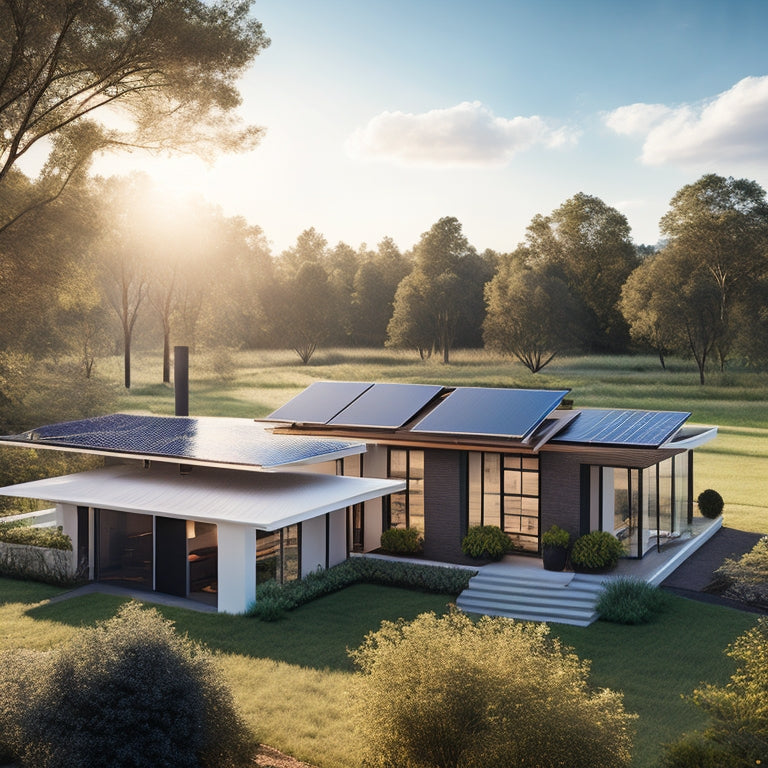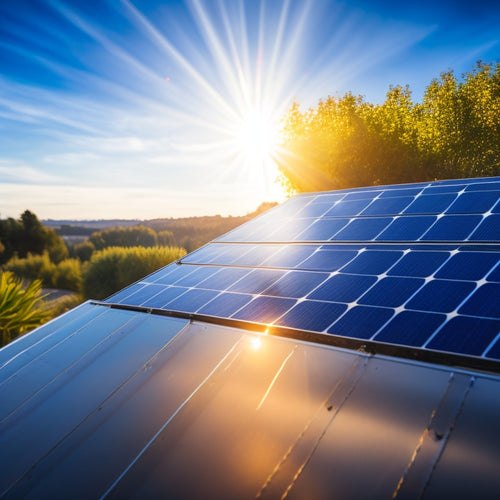
Off-Grid Solar Panel Systems for Home Energy Independence
Share
By investing in an off-grid solar panel system, you're taking the first step towards achieving energy independence and harnessing the power of renewable energy to reduce your reliance on fossil fuels and lower your energy bills. You'll gain significant cost savings and enjoy clean energy. To guarantee a reliable system, it's essential to choose the right solar panels, design an efficient system, and install it properly. You'll need to take into account energy storage solutions, system components, and maintenance tips. Now, discover how to optimize your off-grid solar panel system for maximum energy independence.
Key Takeaways
• Off-grid solar panel systems provide energy independence by harnessing renewable energy and reducing reliance on fossil fuels.
• A well-designed system with efficient components, including solar panels, charge controllers, and inverters, ensures a reliable energy supply.
• Energy storage solutions, such as battery banks, are essential for a steady power supply, and high-efficiency inverters are crucial for minimizing energy loss.
• Choosing the right solar panels depends on factors like panel efficiency, manufacturer reputation, local incentives, durability, and warranty options.
• Proper installation, regular maintenance, and monitoring system performance are vital for optimal energy harvesting and system longevity.
Benefits of Off-Grid Solar Energy
By harnessing the power of off-grid solar energy, you can enjoy a multitude of benefits that not only reduce your carbon footprint but also provide energy independence and cost savings.
With off-grid solar, you can break free from the grid and enjoy renewable freedom, relying solely on the sun's energy to power your home or business. This means you'll no longer be tied to the grid, reducing your reliance on fossil fuels and decreasing your carbon footprint.
Off-grid solar energy also provides energy self-sufficiency, giving you control over your energy needs. You'll no longer be at the mercy of utility companies, and you'll be protected from rising energy costs.
With off-grid solar, you can enjoy significant cost savings, as you'll be generating your own clean energy. Plus, with the cost of solar panels decreasing over the years, investing in off-grid solar energy is becoming an increasingly viable option for those seeking energy independence.
How Off-Grid Solar Systems Work
As you explore how off-grid solar systems work, you'll discover that they're made up of several key components that work together to provide reliable energy.
You'll need to understand how these components, including solar panels, charge controllers, and inverters, interact to generate and store energy.
System Components Overview
Your off-grid solar panel system consists of several critical components that work together to convert sunlight into electrical energy, store it, and distribute it to your appliances and devices. These components are carefully selected and designed to guarantee a reliable and efficient energy supply.
Here's an overview of the key components:
| Component | Function | Importance |
|---|---|---|
| Solar Panels | Convert sunlight into electrical energy | High |
| Charge Controller | Regulates energy flow to battery | High |
| Inverter/Converter | Converts DC power to AC for appliances | Medium |
| Mounting System | Secures solar panels to roof or ground | Medium |
| Wiring and Connectors | Transfers energy between components | Low |
Each component plays a crucial role in the system's overall performance. A well-designed system ensures that each component works in harmony to minimize energy loss and maximize efficiency. However, component failure can occur, which is why it's crucial to consider system design and redundancy when building your off-grid solar panel system. By understanding how each component interacts, you can create a reliable and efficient energy system that meets your needs.
Energy Storage Solutions
Storing excess energy generated by your off-grid solar panel system is essential to maintain a steady power supply when the sun isn't shining. This is where energy storage solutions come in. You'll need a reliable battery bank to store the excess energy generated by your solar panels during the day, so you can use it at night or on cloudy days. When choosing a battery, consider its depth of discharge (DOD), cycle life, and maintenance requirements. Proper Battery Maintenance is vital to extend the lifespan of your batteries.
A high-efficiency inverter is also important to guarantee maximum energy harvest. Look for an inverter with high Inverter Efficiency to minimize energy losses. A good inverter should be able to handle the maximum power output of your solar array and provide a stable AC output.
Choosing the Right Solar Panels
Choosing the right solar panels for your off-grid system is crucial, as the panels' quality and performance will greatly impact your energy independence. You'll want to take into account several key factors to make sure you're getting the most out of your investment.
Here are some key considerations to bear in mind:
-
Panel Efficiency: Look for panels with high efficiency ratings to maximize energy production per unit area.
-
Manufacturer Reputation: Research the manufacturer's reputation for producing high-quality, reliable panels.
-
Local Incentives: Check if local authorities offer incentives for using specific types of solar panels or manufacturers.
- Panel Durability and Aesthetic Appeal: Consider panels with durable designs and sleek aesthetics that fit your home's style.
Additionally, don't forget to explore warranty options and panel durability to guarantee your system lasts for years to come. By carefully evaluating these factors, you'll be well on your way to harnessing the power of the sun for your off-grid solar panel system.
Off-Grid Solar System Components
When designing an off-grid solar panel system, you'll need to select the appropriate components to guarantee efficient energy harvesting and storage.
The solar panel array is a vital part of this system, as it converts sunlight into electrical energy.
You'll also need a charge controller unit to regulate the flow of energy between the solar panels and your battery bank.
Solar Panel Array
You'll need a solar panel array that's properly sized and configured to meet your off-grid energy requirements. A well-designed array is essential to harnessing sufficient energy from the sun. Panel efficiency plays a significant role in determining the overall performance of your off-grid solar panel system. When selecting solar panels, look for high-efficiency models that can maximize energy production per unit area.
To guarantee ideal array design, consider the following key factors:
-
Panel orientation: Make sure panels face the correct direction (south in the northern hemisphere) to capture maximum sunlight.
-
Tilt angle: Adjust the tilt angle to match your latitude for optimal energy harvesting.
-
Shading analysis: Identify potential shading sources and adjust the array design accordingly.
- Array configuration: Choose a configuration that balances energy production and cost, such as a series-parallel setup.
Charge Controller Unit
Now that your solar panel array is optimized for energy production, it's time to regulate the flow of electricity with a dependable charge controller unit. This vital component guarantees maximum efficiency and power optimization by preventing overcharging or undercharging of your battery bank. A high-quality charge controller unit will intelligently manage the energy flow, protecting your batteries and extending their lifespan.
When selecting a charge controller unit, consider the following key factors:
| Feature | Description |
| Maximum Power Point Tracking (MPPT) | Secures maximum energy harvesting from your solar panel array |
| Low Voltage Disconnect (LVD) | Prevents deep discharging of your batteries |
| Temperature Compensation | Adjusts charging voltage based on battery temperature |
| Monitoring and Control | Enables real-time monitoring and control of your off-grid system |
Sizing Your Off-Grid Solar System
Accurately sizing your off-grid solar system is crucial to make sure it can meet your energy demands, especially during periods of low sunlight. You need to guarantee that your system can handle your energy needs, even on cloudy days or during winter months when sunlight is scarce.
To get it right, you'll need to conduct a thorough energy audit and evaluation. This involves analyzing your energy usage patterns, identifying areas of inefficiency, and determining the total wattage required to power your home.
Here are the key considerations for sizing your off-grid solar system:
-
Peak Sun Hours (PSH): The amount of solar energy available at your location.
-
Load Calculations: The total wattage required to power your home, taking into account appliances, lighting, and other energy-intensive devices.
-
Energy Audits: A comprehensive assessment of your energy usage patterns and areas of inefficiency.
- System Configuration: The number and type of solar panels, batteries, and inverters required to meet your energy needs.
Installation and Maintenance Tips
Proper installation and regular maintenance are crucial to guarantee your off-grid solar panel system operates at peak efficiency and longevity. When installing your system, you'll want to make sure you've considered proper grounding considerations. This includes making certain your system is properly bonded and grounded to protect against electrical shock and fire hazards.
You'll also want to implement effective wiring strategies, such as using UV-resistant wiring and securing cables to prevent damage from environmental factors.
During maintenance, you'll want to inspect your system regularly to identify any potential issues before they become major problems. Check for signs of wear and tear on cables and connections, and ensure all components are securely fastened.
You should also monitor your system's performance regularly to identify any dips in efficiency. By staying on top of maintenance, you'll be able to identify and address any issues promptly, ensuring your system continues to operate at peak performance.
Frequently Asked Questions
Can I Use Off-Grid Solar Panels With a Septic System?
You can use off-grid solar panels with a septic system, but it's important to prioritize water conservation to minimize wastewater generation, ensuring efficient septic maintenance and avoiding system overload.
How Do I Handle Snow on My Solar Panels?
As winter's icy grip tightens, you'll need to brush off the snowflakes from your solar panels; employ gentle snow removal methods, like soft-bristled brushes or specialized snow rakes, and prioritize winter maintenance tips, like tilt adjustment and regular cleaning, to keep your energy harvest thriving.
Can I Add Batteries Later to My Off-Grid System?
You can definitely add batteries later to your existing off-grid system, considering a system expansion or battery upgrades, which will require evaluating your current setup's compatibility and ensuring a seamless integration for best performance.
Will Off-Grid Solar Power Work With a Well Pump?
You'll need to take into account pump sizing and water pressure when determining if off-grid solar power can work with your well pump, ensuring the system can handle the pump's energy demands and maintain consistent water pressure.
Do I Need a Backup Generator for My Off-Grid System?
'As you weigh energy security, consider this: a backup generator can guarantee system reliability during extended periods of low sunlight or high energy demand, but proper generator sizing is vital to avoid overspending.'
Related Posts
-

Top Eco-Friendly Camping Equipment for a Sustainable Adventure
When you're camping with the planet in mind, opt for eco-friendly gear like tents made from recycled materials and bi...
-

Smart Home Thermostats to Revolutionize Your Space
Smart home thermostats revolutionize your space by providing precise temperature control and optimizing energy saving...
-

How Efficient Are Thin Film Solar Cells
Thin film solar cells provide an innovative approach to energy generation, boasting efficiency rates generally betwee...


